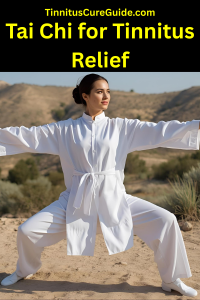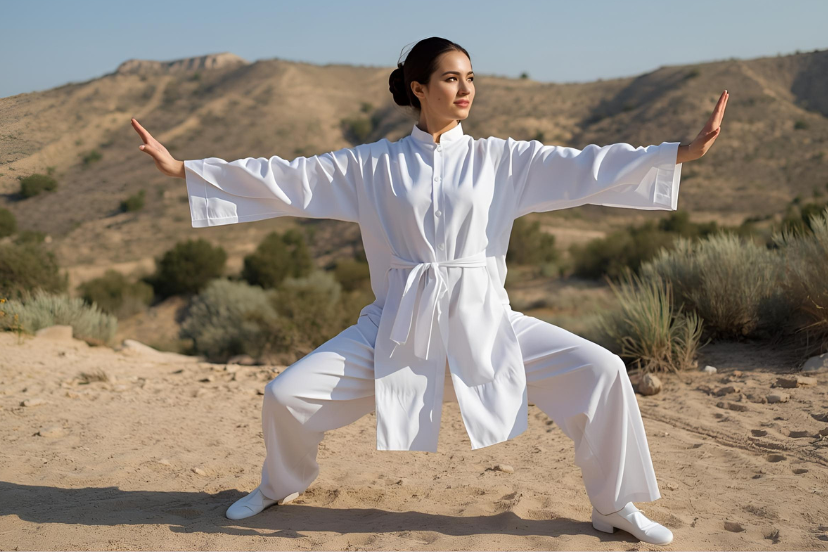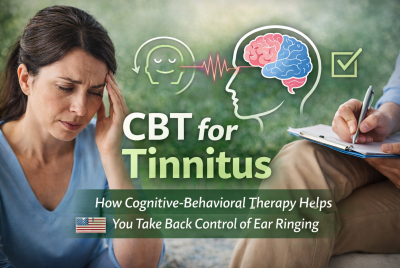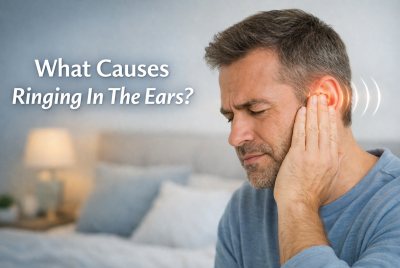Tai Chi for Tinnitus Relief: Can Gentle Movement Calm Ear Ringing?
If you live with ringing in the ears, buzzing, whooshing, or other phantom sounds, you know how overwhelming tinnitus can be. The noise can feel constant, unpredictable, and even louder during moments of stress. While doctors may recommend treatments like sound masking devices, hearing aids, or medications, many people look for natural ways to complement care. One increasingly popular approach is tai chi for tinnitus relief.
This gentle, ancient Chinese practice combines slow movements, breathing, and meditation to calm both body and mind. But can it really help with ear buzzing sounds, constant ear ringing, and stress-related flare-ups? Let’s explore how tai chi may support tinnitus sufferers and offer practical tips for getting started.
What Is Tai Chi and Why Is It Linked to Tinnitus?
Tai chi is often described as “meditation in motion.” It involves fluid, low-impact movements coordinated with breathing and mental focus. In the U.S., it’s widely practiced as a form of stress relief, balance training, and gentle exercise.
So how does this connect to tinnitus?
-
Stress and Tinnitus Connection: Stress is one of the most common triggers for worsening chronic tinnitus. Tai chi’s proven ability to reduce anxiety and lower stress hormones may calm flare-ups.
-
Improved Circulation: Healthy blood flow is essential for the auditory system. Tai chi may enhance circulation, supporting inner ear function.
-
Mind-Body Awareness: By focusing attention away from intrusive noise, tai chi can help retrain the brain’s response to high-pitched ear noise or ear ringing at night.
How Tai Chi May Help with Tinnitus
1. Reduces Stress and Anxiety
Stress is a well-documented trigger for sudden tinnitus spikes. Tai chi lowers cortisol levels, promotes relaxation, and encourages deep breathing. This directly helps with stress and tinnitus connection flare-ups.
2. Improves Sleep Quality
Many tinnitus sufferers struggle at night. Practicing tai chi before bedtime may reduce ear ringing at night, improve sleep onset, and make white noise for tinnitus therapies more effective.
3. Supports Balance and Cervical Health
Poor posture and neck tension can contribute to cervical tinnitus causes. Tai chi emphasizes upright posture and fluid movement, which may ease musculoskeletal strain linked to tinnitus.
4. Enhances Emotional Resilience
Living with constant ear ringing can cause frustration and even depression. Tai chi’s meditative quality encourages mindfulness, helping people cope emotionally and reduce tinnitus distress.
Tai Chi Exercises for Ear Ringing
If you’re new to tai chi, you don’t need to master long routines. Even simple moves can help. Here are beginner-friendly tai chi exercises adapted for tinnitus relief:
The “Wave Hands Like Clouds”
-
Stand with feet shoulder-width apart.
-
Slowly move your arms side to side, as if pushing clouds.
-
Focus on your breathing—inhale through the nose, exhale through the mouth.
👉 This rhythmic motion reduces tension and calms the mind.
“Opening the Chest”
-
Stand tall, arms at your sides.
-
Inhale as you bring your arms out to the side and up to chest level.
-
Exhale while lowering your arms slowly.
👉 Helps release tightness in the chest and neck, reducing stress-related tinnitus flare-ups.
“Breathing with the Earth”
-
Place one hand on your abdomen, the other at chest level.
-
Inhale deeply, feeling your belly expand.
-
Exhale slowly while visualizing releasing stress.
👉 Excellent for calming the ear buzzing sound at night.
Practice these moves for 10–15 minutes daily. Over time, many people report reduced tension and improved tolerance to tinnitus.
Does Tai Chi Help Tinnitus? What Science Says
Research directly on tai chi for tinnitus relief is limited, but several studies highlight its benefits for conditions closely related to tinnitus:
-
Stress & Anxiety Reduction: Clinical studies show tai chi lowers stress and anxiety levels, both key triggers for tinnitus.
-
Sleep Quality: A 2016 U.S. trial found tai chi improved sleep among older adults, a major issue for those with chronic tinnitus.
-
Balance & Cervical Health: Tai chi strengthens postural stability, which may help address causes of cervical tinnitus.
While more tinnitus-specific research is needed, evidence strongly suggests that tai chi can be a valuable complementary therapy.
Integrating Tai Chi with Other Tinnitus Remedies
Tai chi works best when combined with proven tinnitus remedies. Here’s how you can create a holistic plan:
-
Sound Therapy – Pair tai chi with tinnitus sound therapy apps or white noise for tinnitus at night.
-
Hearing Aids for Tinnitus – For those with hearing loss, hearing aids with masking features can be combined with relaxation routines.
-
Best Supplements for Tinnitus – Nutrients like magnesium, Ginkgo biloba, GABA, and zinc support auditory health.
-
Lifestyle Adjustments – Limiting caffeine, protecting ears from loud noise, and staying hydrated can reduce flare-ups.
Tinnitus Prevention Tips: Using Tai Chi to Stay Ahead
Practicing tai chi for tinnitus relief isn’t just about managing symptoms when they flare up—it can also help prevent flare-ups from happening in the first place. By combining mindful movement with lifestyle adjustments, you can reduce the frequency and intensity of ear ringing, ear buzzing sound, or high-pitched ear noise. Here’s how:
1. Make Tai Chi a Daily Habit
-
Even 10–15 minutes a day can significantly reduce stress and improve circulation.
-
Consistency is key: daily practice keeps the nervous system calm, which helps prevent stress-related tinnitus flare-ups.
-
Try short morning sessions to start your day relaxed, or evening sessions to ease ear ringing at night.
2. Combine Tai Chi with Breathing and Meditation
-
Focused breathing during tai chi lowers cortisol and heart rate, both of which can trigger tinnitus.
-
Meditation incorporated into your routine improves mental resilience, reducing the emotional impact of constant ear ringing.
-
Example: Breathe in for 4 counts, hold for 2, exhale for 6 while performing slow tai chi movements.
3. Maintain Proper Posture and Neck Alignment
-
Many tinnitus flare-ups are linked to cervical tinnitus causes caused by neck and shoulder tension.
-
Tai chi encourages upright posture, gentle neck rotation, and shoulder relaxation, helping prevent musculoskeletal-related tinnitus.
-
Pay attention to your workspace ergonomics and take breaks to stretch your neck during sedentary work.
4. Manage Stress Holistically
-
Tai chi is most effective when combined with other stress-reducing habits:
-
Journaling or mindfulness exercises
-
Listening to calming music or white noise for tinnitus
-
Light aerobic activity, like walking or swimming, to improve circulation
-
-
Reducing daily stress helps prevent sudden spikes of ear buzzing sound or whooshing in ears.
5. Protect Your Ears from Loud Noise
-
Avoid prolonged exposure to loud environments, and always use high-quality earplugs at concerts or when using power tools.
-
Combining hearing protection with tai chi helps prevent tinnitus after loud noise exposure, rather than only managing symptoms afterward.
6. Support Your Hearing with Lifestyle and Nutrition
-
Stay hydrated and maintain a balanced diet rich in magnesium, B vitamins, and omega-3 fatty acids.
-
These nutrients support ear and nerve health, complementing the relaxation benefits of tai chi for stress and tinnitus.
-
Limiting caffeine and alcohol may also reduce high-pitched ear noise intensity.
7. Track Your Progress
-
Keep a small journal noting:
-
Frequency of tinnitus flare-ups
-
Duration and type of tai chi sessions
-
Stress levels, sleep quality, and triggers
-
-
Over time, you’ll see patterns and be able to adjust your practice to stay ahead of chronic tinnitus symptoms.
👉 Takeaway: Incorporating tai chi for tinnitus relief into your daily routine, combined with mindful stress management, proper posture, and ear protection, provides a proactive approach to reducing flare-ups. Prevention is about consistent, gentle care for both body and mind.
When to See a Doctor
While tai chi may ease symptoms, it’s not a replacement for medical care. You should seek medical attention if you experience:
-
Sudden tinnitus after loud noise exposure
-
Pulsatile tinnitus (hearing heartbeat-like sounds)
-
Tinnitus in only one ear
-
Hearing loss or dizziness along with ear ringing
-
Tinnitus that worsens over time
A healthcare professional can rule out underlying conditions and recommend treatments such as hearing aids for tinnitus or specialist therapies.
FAQs on Tai Chi and Tinnitus
1. Does tai chi help tinnitus?
Yes. Tai chi reduces stress, improves blood circulation, and promotes relaxation. These benefits can make ringing in the ears, ear buzzing sounds, and high-pitched ear noise less noticeable, helping many people with chronic tinnitus manage their symptoms naturally.
2. How often should I practice tai chi for tinnitus relief?
Practicing tai chi exercises for ear ringing for 10–20 minutes daily is ideal. Consistency helps reduce stress, improve sleep quality, and can calm ear ringing at night, supporting long-term management of tinnitus symptoms.
3. Can tai chi replace medical treatment for tinnitus?
No. Tai chi is a complementary, natural treatment for tinnitus. It helps manage stress and discomfort, but should be combined with professional care, sound therapy, or hearing aids for optimal relief.
4. Is tai chi safe for older adults with tinnitus?
Yes. Tai chi is low-impact, gentle, and widely practiced by older adults in the U.S. It helps improve balance, posture, and stress management, making it suitable for most people with chronic tinnitus.
5. Can tai chi reduce stress-related tinnitus flare-ups?
Absolutely. Stress often worsens constant ear ringing and whooshing in ears. Tai chi promotes relaxation, lowers cortisol levels, and improves mental focus, which can prevent or reduce stress-triggered tinnitus spikes.
6. What tai chi movements are best for tinnitus relief?
Gentle, beginner-friendly movements such as “Wave Hands Like Clouds,” “Opening the Chest,” and deep-breathing exercises are recommended. These moves relieve tension in the neck and shoulders, reducing cervical tinnitus symptoms and calming intrusive ear noises.
7. Can I combine tai chi with other tinnitus remedies?
Yes. Tai chi complements tinnitus sound therapy, white noise for tinnitus, supplements such as magnesium or Ginkgo biloba, and hearing aids. Combining approaches often provides the best relief from ear ringing and its causes.
Tai Chi for Tinnitus Relief – Conclusion
Tinnitus can be frustrating, unpredictable, and emotionally draining. While there’s no one-size-fits-all cure, practices like tai chi for tinnitus relief offer a gentle, accessible way to calm the body and quiet the mind. By combining tai chi with proven tinnitus remedies such as sound therapy, supplements, and hearing aids, many people regain control over symptoms and live fuller, more peaceful lives.
👉 If you’re searching for a safe, natural method to manage tinnitus, tai chi may be the mindful movement practice you’ve been looking for.
Disclaimer
This article is for informational purposes only and does not substitute professional medical advice. Always consult a licensed healthcare provider before beginning new treatments, supplements, or exercise programs for tinnitus or related conditions.






